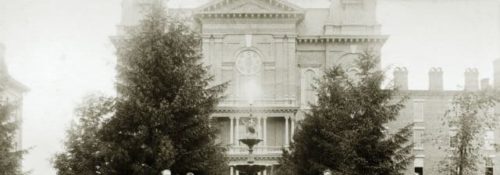
A Brief History of Hillsdale, Part 1: The Nineteenth Century
Written by Jacquelyn Eubanks
“The object of this institution is to furnish to all persons who wish, irrespective of nation, color, or sex, a literary and scientific education.”
The train pulls into the Jackson station. Its shrill whistle pierces the sky, announcing its arrival. You grasp the handle on the travelling trunk and file down the aisle of the car. You take a few steps down onto the platform, smoke billowing out of the stack on the engine and trailing behind it in the wind. Now you’ll have to catch a stagecoach to the college, more than thirty miles away from the station. You’re sweltering in the August heat; the sun is beating down. At last you hitch a ride to campus, crowding into the carriage with other young people, all chattering excitedly about the coming academic term. You gaze out the open-air windows of the buggy. Trees and quaint houses roll by. After several hours, you catch sight of it—the clock tower atop Central Hall. You’ve arrived at Hillsdale College.
This was the experience of many students throughout the nineteenth century. What began as Michigan Central College at Spring Arbor in 1844—a one-room, Free Will Baptist school meant for the education of clergy and their children—became Hillsdale College eleven years later. Despite the name and location changes, the college’s founding principles of “education as the handmistress of religion,” liberty, and equality have remained the same from its conception.
Radical Roots
Hillsdale College was the product of a “remarkably progressive” Christian sect whose mission was “attacking the liquor traffic, the opium habit, slavery, and organized vice in uncompromising terms.” The Free Will Baptists who pioneered the college were deeply religious abolitionists and teetotalers, which explains the college’s activist roots. This foundation of freedom and equality made Hillsdale the first college in Michigan and the second in the nation “to admit women on an equality with men.” Prior to this, if women were allowed to go to college at all, they almost certainly were confined to studying home economics at all-female institutions; at Hillsdale, however, women had the opportunity to study any variety of majors, most notably classics and science, in a uniquely coeducational environment. A perfect illustration of this breakthrough in education was the first graduate, Elizabeth Camp. Not only was she the first woman to receive a college degree in Michigan, but she graduated with a bachelor of science in 1851.
Back in those days tuition was only $12 per year, enrollment was only 493 students, and daily prayers and Sunday services were mandatory. The classes all students were required to take included Latin, Greek, algebra, geometry, history, anatomy, astronomy, logic, rhetoric, political economy, philosophy, “constitutions of the United States and England,” “Christian evidences,” geology, botany, law, and chemistry. Even today, Hillsdale’s core curriculum reflects this liberal arts tradition; students are still required to take a foreign language, a math course, history, biology, logic and rhetoric, philosophy, U.S. Constitution, theology, and chemistry. Among the first extracurriculars were literary societies, Greek fraternities and sororities, debate teams, publications such as magazines, and public speaking and essay contests.
That’s not to say life at Hillsdale College was perfect. Despite being “coeducational in a day when coeducation was considered a dangerous suggestion,” there were relatively strict rules regarding conduct between the ladies and gentlemen. If a couple so much as wanted to take a walk together, special permission was required from the college president or dean of women. There was controversy and outcry when faculty abruptly decided clubs or societies could not be coed, when previously they’d been open to anyone. Students described in letters home that the campus looked chaotic with buildings only half-completed, to the point where some dormitories were not furnished for use despite students being assigned to live in them. The dining hall was in a “long, dreary” cellar illuminated only by candlelight.
Nevertheless, the college years were a happy time. Elizabeth Smith Mosher, who attended Hillsdale during the Civil War years, recounted how much she loved her professors; how her roommate became her best friend; how her classes and clubs inspired new interests in her that “stayed with [her] all [her] long life.”
Breaking the Bonds of Slavery
The Civil War years were, perhaps, the college’s finest hour. Hillsdale’s abolitionist leanings were no secret; its Articles of Association, adopted in 1855, explicitly stated, “The objective of this institution is to furnish to all persons who wish, irrespective of nation, color, or sex, a literary and scientific education as comprehensive and thorough as is usually pursued in other colleges in this country.” “The 1850 charter of the college, granted by the state of Michigan, was the first in the United States to prohibit discrimination on the basis of gender, race, or religion.” Furthermore, the Free Will Baptists who founded the school were anti-slavery activists, and many of the college’s leaders helped create the Republican Party in 1853 to advance the abolitionist movement. It seemed it was Hillsdale’s destiny to answer the call of duty when the time came. The sacrifices made by the college and its students during the war years seem to be the fulfillment of its most sacred beliefs.
When the Civil War broke out in 1861 and President Lincoln called for troops, “the percentage of male students [who enlisted] from Hillsdale College was higher than that of any other Michigan college… Over 500 Hillsdale men volunteered for Civil War duty… Three won Congressional Medals of Honor.” Letters from students on the front lines are full of reminiscences of their college days, tainted with sadness by the reality that they might never see their beloved friends and campus again. They remained firm in their convictions, however; they often asserted that they knew God had called them to stand for the good, even if it cost them their lives.
Perhaps what makes this so poignant is the drastic difference between the actions of the Hillsdale students on the battlefield and other students at prominent Northern colleges. Samuel Eliot Morison, a noted American historian and Harvard history professor, wrote about Harvard University:
It is difficult for anyone…to understand the cool attitude of the college toward the Civil War. College life went on much as usual, and with scarcely diminished attendance. Public opinion in the North did not require students to take up arms…there was no mass movement into the army or navy, and draftees who hired a substitute were not despised. President Lincoln kept his son at Harvard until he graduated in 1864, and then gave him a staff appointment. The Harvard-Yale boat race was rowed at Worcester, before a large and enthusiastic crowd, on July 29, 1864, at a time when the Union was desperately in need of men; but not one of the twelve oarsmen enlisted.
Compare this historical account to the experience of Hillsdale College student Moses Luce on May 10, 1864—the same year as the Harvard account, only months earlier:
We kept up the fire for a few minutes when someone said: “Luce, someone is calling you on the picket line.” I listened intently and heard a man calling: “I am bleeding to death, I am bleeding to death.” I knew the voice. It was one of my old college student friends and he apparently was dying under the guns of the enemy or would die if left without help. I dropped my musket, leaped out of the ditch, rushed down the hill and up the hill on his side, and found him lying prostrate, one leg shattered by a grape shot. While I was rushing forward I felt the whiz of the musket balls, fired at me evidently. I stooped down over him and said: “LaFleur, I have come for you,” and as I stooped down over him I asked him to get on my back. The enemy apparently stopped firing when they saw what I was doing…I got him on my back and stooped down as low as I could, almost creeping. I carried him through my lines back of a little house in the vicinity, which saved him from the enemy’s fire…His whole leg below the knee was shattered to pieces. The surgeon amputated it at the knee joint and bound up his wound.
For this act of heroism, Luce was awarded the Congressional Medal of Honor.
Activism on the Homefront
The male students were not the only ones to take an active role in the war effort; many female students volunteered as field nurses and wrote letters to soldiers to maintain morale. Prominent anti-slavery activists came to speak at the college during these years, most notably Frederick Douglass, Charles Sumner, William Lloyd Garrison, and Henry Ward Beecher (the brother of Uncle Tom’s Cabin author Harriet Beecher Stowe). In the aftermath of the Civil War, “some students went south and volunteered their services to educate freemen during Reconstruction and…the college and its veterans supported early reconciliation with the South.” Newly-freed blacks seeking education found it at Hillsdale. The college’s mission statement seemed fulfilled in the wake of such a tragedy: freedom and equality, won on the battlefield, reigned supreme at the college.
When examining the history of any college, there are always going to be some things worthy of pride. Yes, Hillsdale was the first college in Michigan to elect women to the Board of Trustees; to establish a biology lab; to issue a college newspaper; and to employ female professors. But more than that, it was the first in the United States to allow anyone who so desired an education to receive it, if only the student worked hard to achieve it and acted with upstanding moral character. When push came to shove, Hillsdale students showed just how deeply their beliefs in freedom and equality were by how far they went to preserve them. While many colleges can boast of their prestigious staff, long history, and famous students, none has quite the historic precedent Hillsdale has of pursuing truth and defending liberty so that, as Abraham Lincoln said on the Gettysburg battlefield, “government of the people, by the people, for the people, shall not perish from the earth.”
For further readings on the history of Hillsdale College, see The First Hundred Years of Hillsdale College by Vivian Lyon Moore (Ann Arbor Press, 1943) and Hillsdale Honor: The Civil War Experience by Arlan K. Gilbert (Hillsdale College Press, 1994). All quotes cited in this article came from these two works.
 Jacquelyn Eubanks, ’20 is an award-winning author with a passion for books, tea, and mountains. Someday she’ll be a world traveler, but for now you can find her typing away at her newest novel.
Jacquelyn Eubanks, ’20 is an award-winning author with a passion for books, tea, and mountains. Someday she’ll be a world traveler, but for now you can find her typing away at her newest novel.
Published in March 2019.